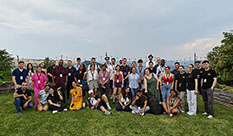More:
News & Stories
Samarkand University - A Time of Hope and Change
An Interview with Khalmuradov Rustam Ibragimovich, Rector of Samarkand University.
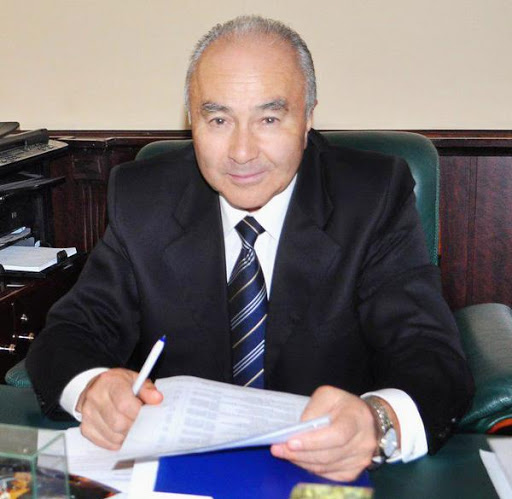
Khalmuradov Rustam Ibragimovich, Rector of Samarkand University
Samarkand University is one of the leading universities in Central Asia. The Holon Institute of Technology and Samarkand University have long-standing collaborations and work together in several joint projects in many different fields.
Samarkand State University was established on September 21, 1420. On this eventful day, in the forum of the great scholar Mirzo Ulugbek, the students were introduced to the theory of Ptolemy.
Rustam Ibragimovich: “It is surprising that this lecture was delivered on the day of the autumnal equinox, which falls on September 21st. To our knowledge, the essence of the lecture was understood by only two people - Ulugbek and his pupil Ali Kushchi, who 30 years later founded Istanbul University. Since that time, lectures in mathematics, astronomy and informatics were delivered here, and much water has flowed under the bridge. Today, however, as Rector of Samarkand University, I have the honor to head one of the leading universities not only in Uzbekistan but in Central Asia.“
Rustam Ibragimovich: “Samarkand University is a classical university, and made a quantum leap in its development four years ago which has continued since. For example, if back in 2016 we had 6,500 students, today we have 27,900 specializing in the professions the country needs. Next year, we expect student to grow to 32,000 and in the next 10-15 years, Samarkand University will have 45-50,000 students in attendance.
In this regard, my main concern right now is construction. Only the day before yesterday, I presented a plan to construct 25 new buildings in the next six years. These will include educational buildings, laboratories and dormitories which will primarily be covered financially by the university, from incomes earned from student tuition, a revenue source we did not have earlier. This year alone we are constructing 8 new facilities, of which 4 will be educational buildings. An important detail to note: no high-rise buildings can be built in the center of Samarkand, as dictated by UNESCO, because of its proximity to world-famous historical monuments.
Here are more facts about the dynamics of change. Four years ago, we had 9 faculties; today we have 18. This includes a new Department of International Educational Studies, whose teachers cooperate with colleagues from Israel, India, China, Russia, France, USA.
We strive to make Samarkand University a magnet for youth and scholars from all of Central Asia, and perhaps the entire continent, just as it was in ancient times. Admittedly, this is not easy and with the exception of recent years, higher education was largely ignored. It is now the time to pick up and develop the ‘stones from the past’.”
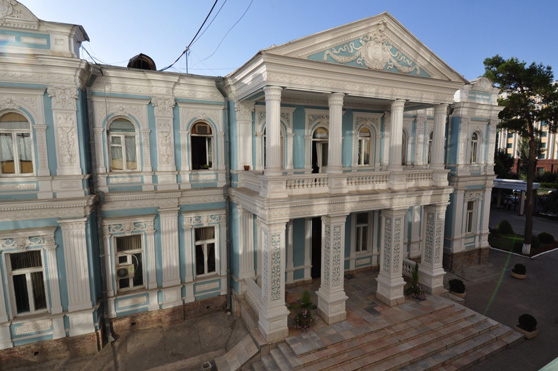
Rustam Ibragimovich: “Scientific innovations have a decisive impact on the economy in all developed countries of the world. We, too, have been trying to take such a path. In Soviet times, people used to defend a thesis for the sake of a thesis, because the notion of ‘commercialization of science’ was not apparent. Today the work of a teacher who is not engaged in applied research is not considered effective.
Recently, the Ministry of Innovation was established. The main role of this ministry, in my opinion, is to become an intermediary between production and science. For example, it is the Ministry of Innovation that is building our new building to house the university technology incubator. I am sure that this "technology park" will bring us many new projects.
Add to this the element of international cooperation with colleagues from abroad. This cooperation is becoming wider and more multifaceted every year. For example, for the basic faculties of our university - mathematics, physics, chemistry - joint projects with the Holon Institute of Technology are important. Another example is the nuclear physics laboratory, which was established at the university thanks to cooperation with the IAEA. Our university also has joint projects with Bauman Moscow State Technical University, with the World Bank, with the Chinese Academy of Sciences, with the Massachusetts Institute of Technology and with the Weizmann Institute of Science in Israel. We participate in projects of the European Erasmus Society. A particularly important area of cooperation is the agricultural sector.”
Rustam Ibragimovich: “Due to local conditions, agriculture is the most important sector for our country. It is not only about food security and exports, but also about the jobs that Uzbekistan so badly needs today. It is the agricultural sector that has been waiting for many years for new innovative solutions that will save water, increase crop yields and improve product quality.
And here we cannot do without international cooperation. Indeed, why reinvent the wheel if we can use the experience of Bologna University in areas such as horticulture and viticulture, or the developments at Ohio University in matters relating to pastures for livestock.
We want our university's Faculty of Agrobiotechnology and Food Security to bring innovation to Uzbek agriculture. In fact, just outside the city, the State has allocated us eight hectares of fertile land for this purpose. Here we will be building a modern agricultural cluster that will include pilot fields and greenhouses, an agricultural college and laboratories.
I take this opportunity to invite all entrepreneurs and scientists from Uzbekistan and beyond to take part in promoting this project. This will be a place for jobs and revenues. If we are able to put agriculture on an innovative track, then by virtue of our geographical location, natural conditions and climate, Uzbekistan may quickly become a major exporter of food for the vast region that includes Afghanistan, Pakistan, Kazakhstan, parts of Russia and China. In this regard, the experience of Israelis would be very useful for us. “
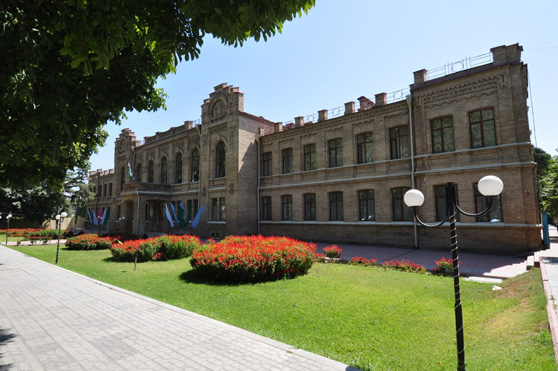
Rustam Ibragimovich: “We have sufficient resources. Today, there are 500 students from abroad studying at the university. These are mainly young people from Afghanistan and India. There will probably be more overseas students in the near future, especially in the new Department of International Educational Studies. Faculty members in this department are actively learning from their colleagues in China, the US, Russia, France, Israel. Drawing on this experience, we will be able to attract more students from abroad to our university. “
Rustam Ibragimovich: “The bulk of them are graduates of our Masters program. They do their internships and go on to doctoral studies and in due course, we transfer them to the departments. We also attract lecturers from Tashkent universities, and invite foreign experts as well. The Corona pandemic has unexpectedly helped us in this regard. Today we have 50 teachers working on an hourly basis. They teach remotely via the Internet and we have established online classrooms in every faculty of the university. I would like to increase them and am very interested in sending our teachers to study and train in foreign universities. The benefits are obvious.”
Rustam Ibragimovich: ‘Of course, at the heart of a classical university is a classical education. But the fundamental sciences are followed by applied disciplines, which lead many of our graduates to go into business and set up their own companies and concerns. This is very important for our country, where not so long ago we knew nothing about the laws of market economy. Today at Samarkand University, business is taught both at the Faculty of Economics and Human Resources and in special courses for all students from other faculties.
Rustam Ibragimovich: “ It wasn't easy at first. We had to go online immediately. We literally had to learn digital technology ‘on the fly’. In the short term, we coped with the problem. But it looks like we will have to live with the Corona virus and similar epidemics in the future, so now we are weighing the pros and cons that the new situation brings with it and building a strategy that will help us to be effective in the coming years.”
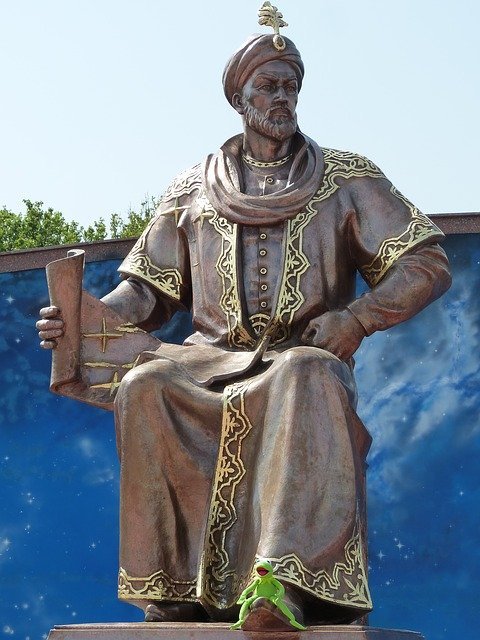
Rustam Ibragimovich: “ In many countries, since the world has become one global village. But, by and large, we train teaching staff for universities and institutes, as well as industrial and agricultural specialists in our region. This is where our graduates are called upon to solve the technical and economic problems of today, for example in the mining industry.”
Rustam Ibragimovich: “ In recent years we have begun to pay serious attention to this issue. The so-called ‘presidential schools’ have appeared in Uzbekistan, where the future intellectual elite of the country is trained. Schools for gifted children are also doing a good job. There is also such a school at our university. Children there receive in-depth training in two areas: physics/ mathematics and biochemistry. We look for talented children at an earlier age. An elite private kindergarten was established in Samarkand, and we started cooperating with it. As they say, the process is ongoing, but undoubtedly, there is still a lot of work to be done.”
Rustam Ibragimovich: “ The most difficult? Sometimes it takes years to convince superiors of the need for a particular project. I am not complaining. After all, the khokim (governor), minister and president may have their own opinion, which does not necessarily have to coincide with mine. I remember when I was a young rector, I also did not take for granted everything experienced professors recommended.
Now that I myself have become an adult grandfather, I somewhat regret this and listen more carefully to people who come to me with their suggestions. But what a pleasure it is when you get results. I enjoy late afternoons when I am at home, quietly reflecting on what else I could propose for this or that department. In the morning, these reflections are translated into concrete action.”
Rustam Ibragimovich: “ Our future as a university is inextricably linked to the future of our country. An interesting era has dawned in Uzbekistan. A time of hope, a time of great changes -- new projects, exciting prospects, the dynamics of development. In this context, a higher education becomes especially relevant. The intellectual elite of our country are being shaped by our universities. Samarkand University is well placed to make a meaningful contribution to the shaping of this elite. This is the principal task for the future. All the rest are the details we will resolve in short order.”
Rustam Ibragimovich: “If I have something to say for myself, let it not be an answer to an unasked question, but a wish. I have many friends in Israel. They are former students and colleagues from long ago, when I worked at the Samarkand Architecture and Construction Institute. They are educated and intelligent people whom I encountered in my work. All of them, although living in Israel and other countries of the world, still retain a great affection for Uzbekistan, where the graves of their forefathers remain.
Friends, our common homeland needs you. Today, Uzbekistan is a free country with great opportunities and attractive investment legislation. We are waiting for your projects, investments and ideas. Let's work together again.
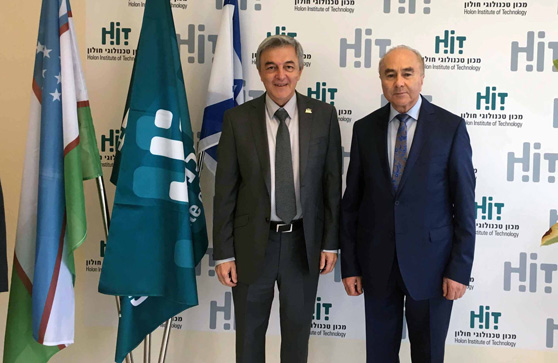
Prof. Eduard Yakubov, President of HIT and Khalmuradov Rustam Ibragimovich, Rector of
Samarkand University
Answers to questions recorded by Leonid Elizarov
Posted: 18/03/2021
- News & Events
International Week of Interdisciplinary Studies and Academic Collaborations in Crete
A substantial delegation of 16 students and four faculty members from HIT Holon Institute of Technology participated in week-long international activities and events at HMU-Hellenic Mediterranean University in Crete. ...


 Additional programs
Additional programs
